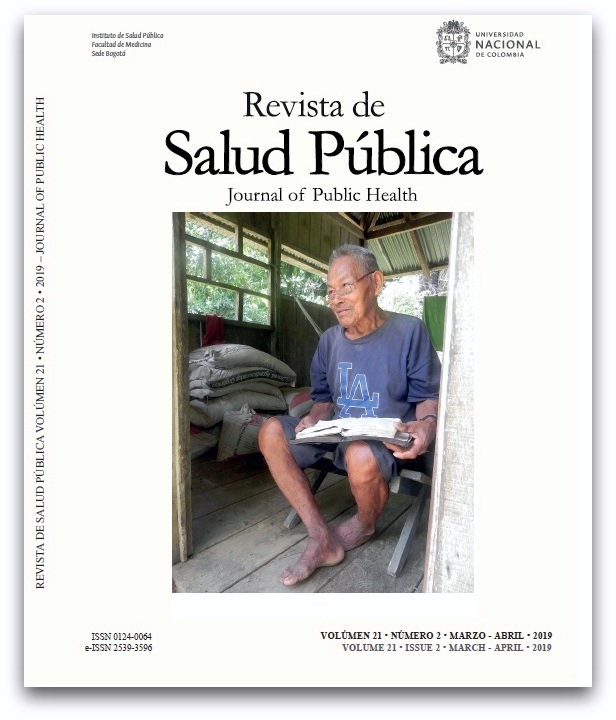Entorno de mujeres embarazadas mexicanas y sus conocimientos y actitudes sobre la atención prenatal
Mexican pregnant women’s environment, knowledge and attitudes on prenatal care
DOI:
https://doi.org/10.15446/rsap.v21n2.78496Palabras clave:
Salud materno-infantil, atención prenatal, poblaciones vulnerables (es)Maternal-Child care, prenatal care, vulnerable populations (en)
Descargas
Objetivos Explorar barreras y facilitadores para contar con atención prenatal, conocimientos sobre embarazo saludable y; actitudes frente al embarazo.
Métodos Estudio cuali-cuantitativo, en embarazadas con vulnerabilidad socio-económica. Se examinaron barreras y facilitadores para recibir atención prenatal y entrevistas estructuradas y semi-estructuradas para evaluar conocimientos y actitudes frente al embarazo. En el análisis cualitativo se categorizaron datos y en el cuantitativo, se estimaron frecuencias y proporciones y promedio y D.E.
Resultados Se entrevistaron 10 mujeres entre 18 y 33 años de edad, 50% acudieron al cuidado prenatal durante el primer trimestre. Los facilitadores para atención prenatal:
roles en la pareja y apoyo familiar. Las barreras: entorno inseguro, al interior y el exterior del hogar y falta de recursos para transportarse. La mayoría no recibió información
para aumentar de peso durante el embarazo. Casi ninguna conocía sobre depresión ni maltrato. La mitad desconocía riesgos del tabaco, alcohol y otras sustancias adictivas,
así como de prevención de enfermedades infecto-contagiosas. Las actitudes en torno al embarazo: con estresores de su entorno; viven en ambientes caóticos; con miedos por el embarazo; e interés por adquirir conocimientos sobre su embarazo.
Conclusión Las mujeres tienen disposición para adquirir conocimientos sobre el embarazo y cuentan con apoyo familiar y de pareja. Su atención debe fortalecer temas de salud mental, violencia familiar, ganancia saludable de peso, riesgos de sustancias adictivas y prevención de enfermedades infecto-contagiosas; contemplando afrontamiento de entornos inseguros, manejo del tiempo y de la economía familiar.
Objectives To explore the barriers and facilitators to prenatal care, as well as the knowledge about healthy pregnancy and the attitude towards pregnancy.
Materials and Methods Mixed-methods study in pregnant women with social and economic vulnerability. Barriers and facilitators for prenatal care were examined using ethnographic methods, while structured and semi-structured interviews wereused to assess knowledge and attitudes. Data were categorized during the qualitative analysis, and frequencies, ratios, average and standard deviation were calculated in the quantitative analysis.
Results Ten women aged between 18 and 33 years were interviewed; 50% sought prenatal care during their first trimester. Facilitators included partner role and family support, and barriers were unsafe neighborhood and home, and lack of funds to cover transportation to the clinic. Most women did not receive information related to weight gain. Almost none knew about depression or abuse. Half of them did not know about risks of addictive substances, nor did they know about prevention of infectious diseases. Finally, attitudes towards pregnancy were: environmental stressors; chaotic homes; fears about pregnancy; and interest in knowing more about pregnancy.
Conclusion The interviewed women were open to learn about their pregnancy and they have family and spouse
support. Prenatal care should be strengthened with topics related to mental health, domestic abuse, healthy weight
gain, risk of addictive substances, and prevention of infectious diseases. They can be enhanced by including safety in unsafe areas, as well as techniques for better time and family economy management.
Referencias
You D, Hug L, Ejdemyr S, Beise J. Levels and Trends in Child Mortality: Report 2015 [Internet]. New York: United Nations Children’s Fund; 2015. Consultado 15 oct 2018. Disponible en: https://uni.cf/2YGonXG.
Organización Mundial de la Salud. Objetivos de Desarrollo Sostenible: Metas [Internet]. Suiza: Organización Mundial de la Salud; 2019. Consultado 22 ene 2019. Disponible en: http://bit.ly/2EaUZz3.
Organización Mundial de la Salud. Recomendaciones de la OMS sobre atención prenatal para una experiencia positiva del embarazo. Suiza: OMS; 2016.
Secretaría de Salud. Norma Oficial Mexicana NOM-007-SSA2-2016, Para la atención de la mujer durante el embarazo, parto y puerperio, y de la persona recién nacida [Internet]. México: Diario Oficial de la Federación; 2016. Consultado 7 abril 2018. Disponible en: http://bit.ly/36tnTGG.
Instituto Nacional de Salud Pública y UNICEF México. Encuesta Nacional de Niños, Niñas y Mujeres 2015 - Encuesta de Indicadores Múltiples por Conglomerados 2015, Informe Final. México: Instituto Nacional de Salud Pública y UNICEF México; 2015.
Santa Rosa P, Hoga L, Reis J. Not worth doing prenatal care: an ethnographic study of a low-income community. Invest Educ Enferm. 2015; 33: 288-96.
Park J, Vincent D, Hastings-Tolsma M. Disparity in prenatal care among women of colour in the USA. Midwifery. 2007; 23(1):28-37.
Novick G. Women's Experience of Prenatal Care: An Integrative Review. J Midwifery Womens Health. 2009; 54(3):226-37.
Duarte S, Oliveira S, Mamede M. Maternal decision on obtaining prenatal care: a study in Brazil. Midwifery. 2011; 27(2):160-4.
Kroenke K, Spitzer R. The PHQ-9: A New Depression Diagnostic and Severity Measure. Psychiatric Annals. 2002; 32(9):509-15.
Familiar I, Ortiz-Panozo E, Hall B, Vieitez I, Romieu I, Lopez-Ridaura R, et al. Factor structure of the Spanish version of the Patient Health Questionnaire-9 in Mexican women. Int J of Meth in Psych Res. 2014; 24(1):74-82.
Ethnohub. AEIOU Framework [Internet]. USA: Ethnohub qualitative research tools in the cloud; 2017. Consultado 10 oct 2018. Disponible en: http://bit.ly/2sgVHZ6.
Division of Reproductive Health, National Center for Chronic Disease Prevention and Health Promotion [Internet]. USA: Centers for Disease, Control and Prevention; 2018. Consultado 25 oct 2018. Disponible en: http://bit.ly/35puthi.
Organización Mundial de la Salud. Manejo de las Complicaciones del Embarazo y el Parto: Guía para las obstetrices y Médico. EUA: OMS; 2002.
Whitehead T. Basic Classical Ethnographic Research Methods. Ethnographically informed community and cultural assessment research systems (eiccars) working paper serie. EUA: University Maryland; 2005.
Ezzy D. Qualitative analysis: Practice and innovation. USA: Allen & Overy; 2002.
Eunice Kennedy Shiver National Institute of Child Health and Human Development. What are the factors that put a pregnancy at risk? [Internet]. USA: NIH; 2017. Consultado 6 mar 2017. Disponible en: http://bit.ly/2Pap3kO. 18. Carolan M, Cassar L. Antenatal care perceptions of pregnant African women attending maternity services in Melbourne, Australia. Midwifery. 2010; 26(2):189-201.
Liamputtong P, Ezzy D. Qualitative research methods: a health focus. 4th ed. Melbourne: Oxford University Press, Melbourne; 2000.
Mendieta G. Informantes y muestreo en investigación cualitativa. Rev. Investigaciones Andina. 2015; 17 (30):1148-50.
Deave T, Heron J, Evans J, Emond A. The impact of maternal depression in pregnancy on early child development. BJOG. 2008; 115(8):1043-51.
Instituto Nacional de Salud Pública. Analizan la depresión posparto y la depresión materna en México [Internet]. México: Instituto Nacional de Salud Pública; 2017. Consultado 5 nov 2018. Disponible en: http://bit.ly/2PwFaIo.
Lara MA, Le HN, Letechipia G, Hochhausen L. Prenatal depression in Latinas in the U.S. and Mexico. Matern Child Health J. 2009; 13:567-76.
Campos B, Yim I, Busse D. Culture as a Pathway to Maximizing the Stress-Buffering Role of Social Support. Hispanic Journal of Behavioral Sciences. 2018; 40(3):294-311.
Heredia I, Servan E, Darney BG, Reyes H, Lozano R. Measuring the adequacy of antenatal health care: a national cross-sectional study in Mexico. Bulletin of the World Health Organization. 2016; 94(6):452-61.
Bermúdez A, Damio G, Cruz J, D'Angelo K, Segura S, Hromi A et al. Stress and the social determinants of maternal health among Puerto Rican women: A CBPR approach. J Health Care Poor Underserved. 2011;22(4):1315-30.
Cómo citar
APA
ACM
ACS
ABNT
Chicago
Harvard
IEEE
MLA
Turabian
Vancouver
Descargar cita
CrossRef Cited-by
1. Júlia Oliveira Silveira, Mara Regina Caino Teixeira Marchiori, Andressa da Silveira, Fabiana Porto da Silva, Zaira Letícia Tisott, Kelvin Leandro Marques Monçalves, Keity Laís Siepmann Soccol. (2024). Motivations and expectations of pregnant women using psychoactive substances during prenatal care: phenomenological study. Investigación y Educación en Enfermería, 42(2) https://doi.org/10.17533/udea.iee.v42n2e10.
2. Márcia Regina Cangiani Fabbro, Fernanda Maranho Santos, Monika Wernet, Jamile Claro de Castro Bussadori, Bruna Felisberto de Souza, Luciana Braz de Oliveira Paes, Juliane de Souza Bravo, Allison Scholler de Castro Vilas Boas. (2024). Percepções de gestantes sobre atenção pré-natal em município do interior paulista. Cadernos Saúde Coletiva, 32(4) https://doi.org/10.1590/1414-462x202432040107.
Dimensions
PlumX
Visitas a la página del resumen del artículo
Descargas
Licencia
Derechos de autor 2020 Revista de Salud Pública

Esta obra está bajo una licencia internacional Creative Commons Atribución 4.0.
Esta revista provee acceso libre inmediato a su contenido bajo el principio de que hacer disponible gratuitamente investigación al publico apoya a un mayor intercambio de conocimiento global.
Todos los contenidos de esta revista, excepto dónde está identificado, están publicados bajo una Licencia Creative Commons Atribución 4.0.





















